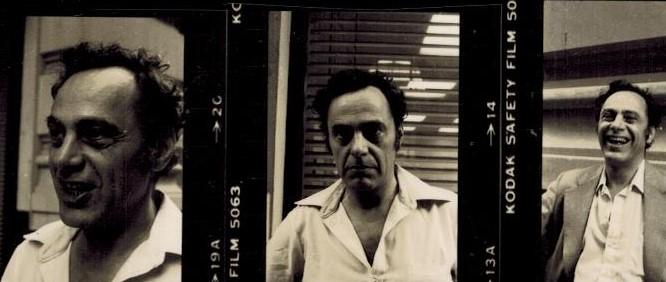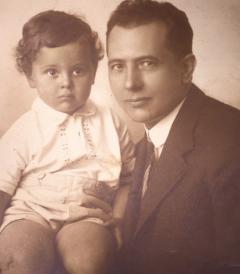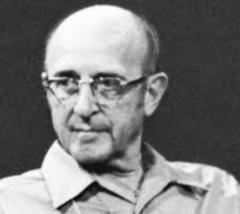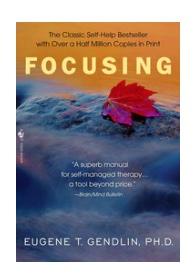HISTORY
The International Focusing Institute was founded informally in 1979 and formally incorportated in 1985. Its purpose is to develop and disseminate the work of American philosopher and psychologist Eugene T. Gendlin (1926 - 2017), especially to promote Focusing as a practice which can be utilized in every aspect of life and society.
Gendlin was born in Vienna in 1926, living there until the age of 11 when the Nazi takeover of 1938 made it mortally dangerous to be a Jew in Austria. Together with his parents he narrowly escaped, first to Holland and then to the United States. His early experience of Nazi totalitarianism deeply affected his thinking and his unyielding opposition to any form of power over other people. He was also deeply affected by the many decisions his father made on the basis of deep intuitive feelings -- "felt senses," as Gendlin later termed them -- by which he navigated the family's escape amidst the chaos of their extreme circumstances.
Gendlin's work is exceptional in the way it bridges the fields of philosophy and psychology, as well as bridging serious academic work to usable techniques for personal development. While a student of philosophy at the University of Chicago in the 1950s, he became a disciple and then colleague of the great American psychologist Carl Rogers, who was revolutionizing the theory and practice of psychotherapy with his "person-centered" approach. Under Rogers' guidance -- and drawing on his deep grasp of both European Phenomenology and American Pragmatism -- Gendlin demonstrated that the key ingredient necessary for a successful therapy outcome was the client's pre-existing capacity for accessing a bodily-felt experience of the issues they were struggling with.
Some clients entered into psychotherapy with this innate capacity, while others did not. The breakthrough came when Gendlin realized that this ability to locate a pre-conceptual, somatic kind of knowing was a trainable skill. He developed a simple six-step practice for finding "felt senses" and drawing on them for deep intuitive insights and fresh, life-affirming action steps. In 1978 Gendlin published this new approach to personal growth in his book Focusing, which went on to sell more than half a million copies in 18 languages. Since then, Focusing is taught in many ways, rarely now conforming strictly to the original six steps laid out in his original book.
HISTORICAL TIMELINE
Timeline PowerPoint of Focusing History (this is a PowerPoint file that will download)
The International Focusing Institute and the network of Focusing teachers have worked for many years to develop Focusing to the point where the public can access information and connect with other individuals who use Focusing in their personal and professional lives. Today, Focusing is applied in many areas and taught around the world in workshops, clinical programs, and at national and international conferences. Focusing has become part of the fabric of our society.
| 1952 | Focusing begins with the philosophical work of Eugene Gendlin, University of Chicago. He teamed up with psychologist Carl Rogers and later developed Focusing and Experiential/Focusing Oriented Psychotherapy. |
| 1957 | The first research on Focusing begins. Eventually, over 100 research studies show Focusing to be a success variable in psychotherapy, and to correlate with personality and physiological measures. |
| 1970 | Eugene Gendlin is the first recipient of the "Distinguished Professional Award in Psychology and Psychotherapy" from Division 29 of the American Psychological Association (Division of Psychotherapy). |
| 1975 | Gene Gendlin attends the AMLA symposium in Zurich at the invitation of Agnes Wild-Missong; Gene and Johannes Wiltschko meet. |
| 1978 | The popular book Focusing is written to make Focusing accessible to the public. |
| 1978-1979 | Linda Olsen (a close associate of Gendlin) conducts the first Focusing workshops in German in Munich and Zurich; Agnes Wild-Missong and Johannes take part. Gendlin appoints Agnes as a Coordinator in Switzerland and Johannes as a Coordinator in Austria. |
| 1979 | The Focusing Institute is established, run by Doralee Katonah Grindler out of the University of Chicago office of Eugene Gendlin, to gather and create resources, and to develop a worldwide teacher training network. The first "Weeklong" teacher training takes place on the university campus. |
| 1980 | Johannes goes to Chicago with Friedhelm Köhne to study with Gendlin. Friedhelm becomes a Coordinator in Germany. |
| 1981 | The Coordinators in Germany, Austria and Switzerland set up a joint office for the German-speaking area, which Johannes manages and later hands it over to Klaus Renn in Würzburg. |
| 1981 | The journal, The Folio, is started to communicate developments in Focusing. |
| 1981 | Friedhelm and Johannes found the German language Focusing Summer School in Austria. Beginning the following year, it took place at Humboldt House near Lindau on Lake Constance. The summer school becomes the starting point for many innovations and projects. |
| 1982 | Mary McGuire becomes the Director of The Focusing Institute, remaining in this position until 1992. |
| 1985 | Mary McGuire and Bala Jaison strengthen training through the "Weeklongs," which begin taking place twice a year. The book Focusing is reprinted a number of times and eventually translated into about 20 languages. |
| 1985 | The Focusing Institute becomes legally incorporated as a not-for-profit organization in the state of Illinois. The compilation of research and writings about Focusing applications in medicine, child care, business, writing, the arts, architecture, environmental management, psychotherapy, and child care is undertaken. |
| 1986 | Let Your Body Interpret Your Dreams published. |
| 1987 | The certification of Focusing teachers begins. |
| 1989 | The first annual International Focusing Conference takes place in Chicago, bringing together Focusers from all over the world to share developments in Focusing. |
| 1990 | Bala Jaison takes over as editor of The Folio, and will be volunteer editor (with a variety of others) until 2016. |
| 1992 | Janet Klein becomes Director of The Focusing Institute. |
| 1995 | A structure of Certifying Coordinators is developed. Certifying Coordinators create their own training opportunities, which serves to de-centralize certification and thereby protects diverse ways of teaching. |
| 1995 | A website is created with an online bookstore, in-depth publications, related links and referrals to Focusing teachers, therapists, and partners. |
| 1996 | Mary Hendricks-Gendlin becomes Executive Director of The Focusing Institute. The Gendlins move to New York, and therefore so does the Institute. |
| 1996 | Focusing-Oriented Psychotherapy is published. |
| 1997 | A Process Model is published. |
| 1997 | Eugene Gendlin and Richard Shweder organize the After Postmodernism Conference at the University of Chicago. |
| 1998 | Over the course of several years, the Thinking At the Edge (TAE) method is developed by Eugene Gendlin and his wife and collaborator, Mary Hendricks-Gendlin, to make the Philosophy of the Implicit operational. |
| 2000 | The "Charlotte and Karl Bühler Award" is given jointly to Gendlin and The Focusing Institute, from Division 32 of the American Psychological Association (the Society for Humanistic Psychology). |
| 2000 | Focusing partnerships take on new prominence with the creation of the Partnership Pool, now known as the Partnership Network. |
| 2006 | The first "Focusing Institute Summer School (FISS)" takes place in Garrison, New York. |
| 2007 | Eugene Gendlin is chosen by representatives of the City of Vienna and the Frankl family to receive the Viktor Frankl Award from the Viktor Frankl Foundation. |
| 2007 | Melinda Darer becomes Managing Director of The Focusing Institute. |
| 2011 | Eugene Gendlin receives the "Distinguished Theoretical and Philosophical Contributions to Psychology" award from Division 24 of the American Psychological Association (The Society for Theoretical and Philosophical Psychology). |
| 2011 | Kye Nelson becomes co-Executive Director of The Focusing Institute. |
| 2013 | Eugene Gendlin and Mary Hendricks Gendlin resign from the Board of The Focusing Institute. Kye Nelson and Melinda Darer also resign as Directors. |
| 2014 | Catherine Torpey becomes Executive Director of The Focusing Institute. A new Board and an International Leadership Council are formed by means of a nominating process where the whole international Focusing community is invited to submit names. |
| 2016 | Eugene Gendlin receives a Lifetime Achievement Award from the World Association for Person Centered and Experiential Psychotherapy and Counseling, as well as a Lifetime Achievement Award from the US Association for Body Psychotherapy. |
| 2017 | 2017 Gendlin passes away and the Board establishes The Eugene T. Gendlin Center for Research in Experiential Philosophy and Psychology in his honor. |
| 2020 | The 50th Advanced and Certified Weeklong becomes the first to be held online. |
| 2021 | Eugene Gendlin receives the APA 2020-2021 Memorial Award for Lifetime Achievement: given to an individual in recognition of distinguished lifetime contributions to humanistic psychology. |
FOCUSING HERITAGE GALLERY




